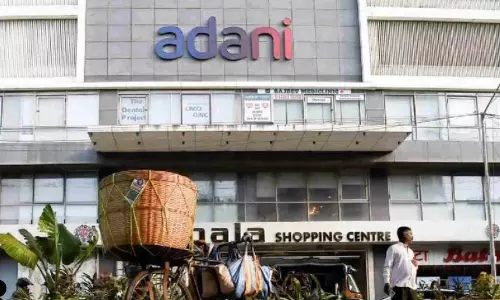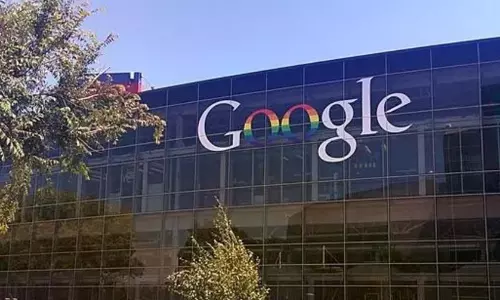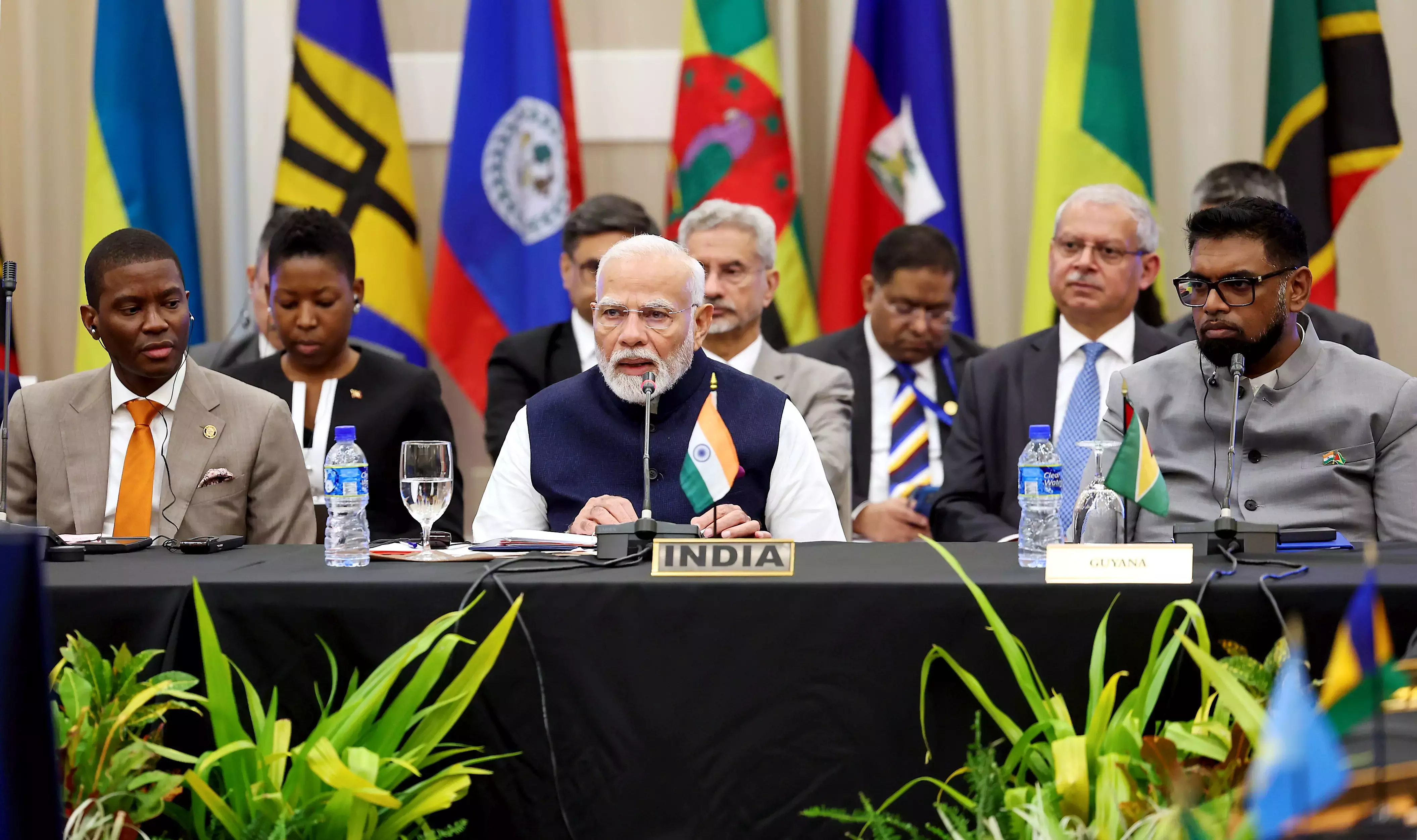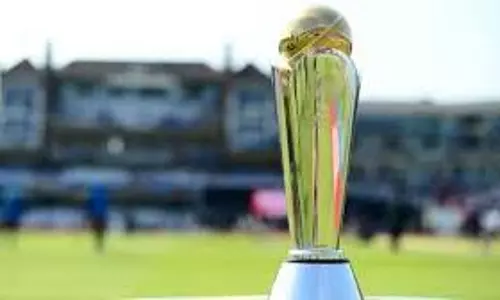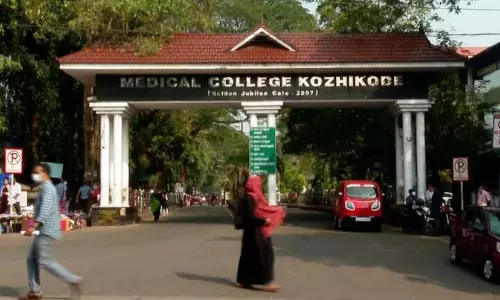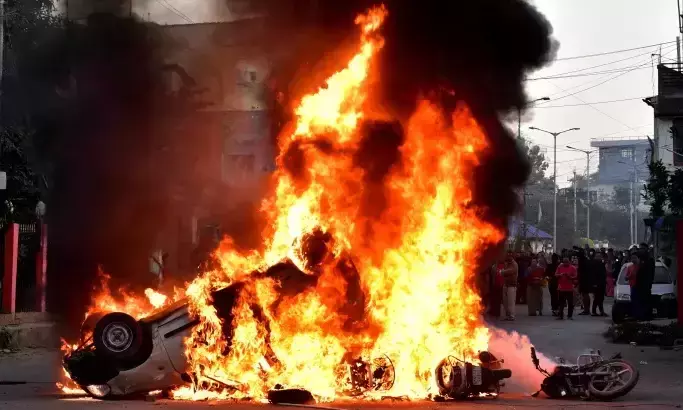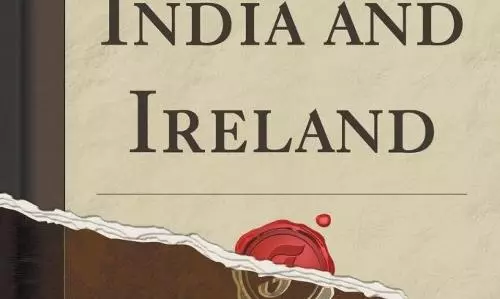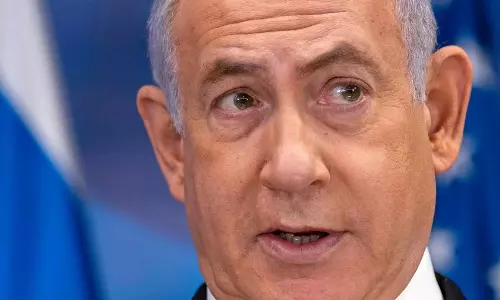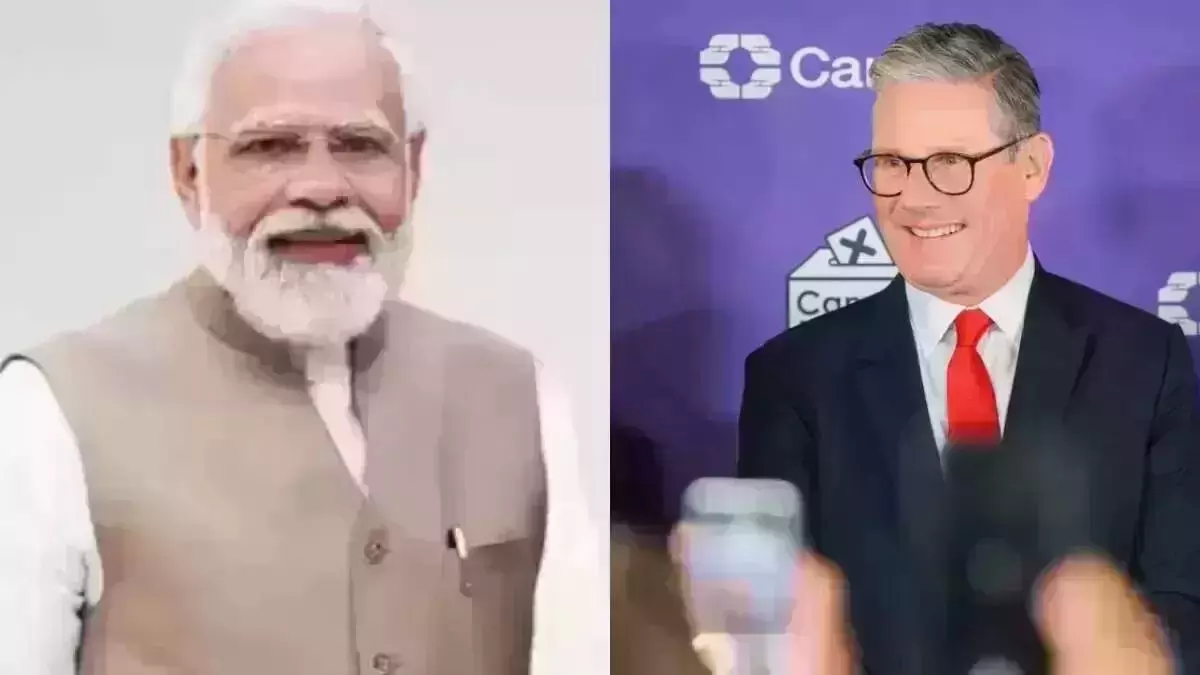
The new British Government and Indo-British relations
text_fieldsOn 5 July Sir Keir Starmer kissed the king’s hand: the gesture whereby he accepts the prime ministership. Keir’s Labour Government includes some people of South Asian origin.
Shabana Mahmood is the Attorney-General. Miss Mahmood is a British Bangladeshi. She attended the same college in Oxford University at the exact same time as Rishi Sunak and got along well at the time.
The Indian community is only about 4% of the UK population. Most of them are British citizens. In some cases, it was their great-grandparents who came to the United Kingdom over a century ago. However, some are Indian citizens. India does not permit dual citizenship, but the United Kingdom does. The UK allows Commonwealth citizens who are legally resident in the country to vote and to be elected to any public office. Therefore, an Indian who moved to the UK today is instantly permitted to vote even if he or she is only in the country for a one-year educational course. India issues Indian-origin British citizens a special document called the Overseas Indian Citizen (OCI) card that entitles them to most rights of Indian citizens, except voting rights.
British Indians used to tend very heavily towards the Labour Party. This was for a multitude of reasons. Labour never tired of reminding Indians that Labour agreed to Indian independence when the Conservative Party was still deeply sceptical about it. Labour was more welcoming of Commonwealth immigration. In 1968 a Conservative politician named Enoch Powell delivered his notorious ‘rivers of blood’ oration in which he denounced immigration as an existential threat to the United Kingdom. In 1972 the UK permitted a lot of Asians resident in Uganda to settle in the United Kingdom when they had been expelled by Idi Amin’s racist policies. A Conservative MP Alan Clark said, ‘’They must be told – you cannot come here because you are not white.’’
The Conservative has changed immeasurably in the last half a century. There are several British Indians who are senior-ranking Conservative politicians.
The Indian community tends to reside in the major conurbations. These are London, Manchester, Glasgow, Birmingham, Leicester and so on. These are strongly Labour areas. British Indians voted Labour means that their voting behaviour is similar to that of their white neighbours. Moreover, the Indian community is a relatively young one. The average age of a person in the UK is 40 but among those of the Indian ethnicity, it is 30. That is due to the immigration of young adults but also a higher birth rate among Indians than whites.
British Indians are more likely to work in the public sector than people in general. Though British Indians are only 4% of the population they are 15% of the doctors. Public sector workers are more likely to vote for Labour than private sector workers.
The more educated a person is, the less likely that person is to vote Conservative. The British Indian community is highly educated.
The Indian community in the UK is less pro-Labour than it used to be. That is partly because racialism was expunged from the Conservative Party a long time ago. The British Indian community is very secure in its position in the UK now. Some children are the fourth generation born in the United Kingdom. The community is also increasingly prosperous. The richer you are, the more likely you are to be Conservative. If you break down the UK by religious denomination, the richest community is the Jewish one. Sikhs are the second richest. Church of England communicants are third then come Hindus. Other Christian denominations are below that. Muslims are quite far down the list.
Hindus and Sikhs are about 60% pro-Labour. Most of the rest are Conservative and very few vote for the minor parties. Muslims are much more divided. They used to be overwhelmingly pro-Labour. However, many are aghast at Labour’s support for the destruction of Gaza.
Four independent Muslim MPs were elected on a Save Gaza ticket. They took their seats from Labour.
There are 11 Sikh MPs and all are Labour. There used to be several Sikh Conservative MPs. Note that 30% of the British Indian community is Sikh as compared to 2% of the population of India being Sikh.
The Labour Party is in office at the UK level for the first time since 2010. Labour has a very healthy majority in the British Parliament which is commonly called Westminster because that is the part of London where it is situated.
The United Kingdom has devolution: Northern Ireland, Wales, Scotland and London all have power devolved to them to deal with certain matters. England outside of London does not have devolution. Labour has won 6 out of 6 elections to the Welsh Parliament. It was only founded in 1999. Labour ran the Scottish Parliament for its first two terms. Labour then lost in Scotland to the Scottish National Party (SNP). The SNP have won the last 4 elections to the Scottish Parliament. The next election there is scheduled for 2026. It looks likely that Labour shall retake the Scottish Parliament thereby ending 19 years of SNP rule. Labour also dominates the London Assembly, and the Mayor of London Sadiq Khan is a Labour man and British Pakistani. Labour would then be running 4 out of the 5 legislatures in the UK. The only one that Labour would not control is the Northern Ireland Assembly. For historical reasons, Labour does not contest elections in Northern Ireland even though they have the legal right to do so.
One might have assumed that Labour would be friendlier towards India. The Conservative Party when it was in government was eager to negotiate a new trade agreement with India. As India is the world’s most populous nation it is a vast market. After Brexit the United Kingdom was able to negotiate trade deals with other countries. The UK was not permitted to do so while it was in the European Union. However, the outgoing Conservative administration failed to secure a trade deal with India. The Government of India wanted to tie trade to more work visas for Indians. Remittances from Indians in the UK are a big boost for many families. The Conservatives were determined to reduce immigration. Negotiations foundered on this.
The United Kingdom does very little trade with India. Belgium trades more with India than the UK does despite Belgium having only a seventh of the population of the UK.
The largest single nationality for foreign-born people in the UK is Indian. That is not surprising considering India has the world’s largest population. 10% of all births in the UK are to women born in India. There are other births to mothers who are of Indian stock but were themselves born in the United Kingdom.
The per capita Gross Domestic Product in the UK is USD 60,000. That is about 20 times higher than in India. Of course, the cost of living in the UK is higher than in India: the cost of food, transport, housing etc… The average Briton is not 20 times better off than the average Indian. He is perhaps 5 times better off. That is still a huge difference.
Labour is more willing to agree to higher immigration. Labour is keenly aware that immigrants are very likely to vote for them.
Labour is not necessarily pro-Indian. Labour relies on votes from the Pakistani community. Many of them come from Jammu and Kashmir. Some Labour politicians lacerate India. Labour is worried because the 4 pro-Gaza independents may latch onto the Kashmir issue. Note that those 4 pro-Gaza MPs were elected in a year in which Labour made massive gains. If that is how well independent Muslim MPs can do in a bumper year for Labour, imagine how well they will do when Labour has a bad year. There are 650 constituencies in the UK. Muslims are a majority in only 10 of them but a plurality in 50 of them. However, the Muslim community is growing rapidly.
Some Sikh Labour voters favour Khalistan. Labour does not go as far as to propose the breakup of India. However, expect Labour to be critical of India’s policy towards separatists. Sikhs are a plurality of the population in several Labour constituencies in London and Birmingham. Not all British Sikhs favour Punjabi independence.
Some Labour MPs have castigated the BJP for chauvinism and Islamophobia. They perceive Narendra Modi as the Indian Trump. The United Kingdom is also unhappy that Shree Modi visited Moscow the day after Russia’s barbaric slaughter of children in a cancer hospital. The Prime Minister of India did not say a word about the atrocity.
Along with other Western nations, the UK wants to tempt India away from Moscow’s orbit. There is a community of interests inasmuch as Russia is increasingly close to China which is Pakistan’s biggest backer. The UK finds China to be quite hostile with massive-scale spying and founding unofficial police stations in the UK to control Chinese people.
UK universities desperately need foreign students because they pay higher fees. Labour will make it easier to secure student visas. Home students pay GBP 9,400 a year for a bachelor’s degree. A bachelor’s is 3 or 4 years depending on the subject. Universities have been pleading with the government for years to allow them to increase the fees. The fees have been frozen for 10 years. Inflation means that in real terms the universities have less and less funding.
International students pay double or triple the home fees. Universities can set international fees as high as they like. Therefore, international students are crucial to the funding of British universities.
Home fees for UK universities are for people who lived in the UK for at least 3 years before they start university. It is not about nationality, it is about where you LIVED! A foreigner resident in the UK for 3+ years before starting a UK university pays home fees. Likewise, a Britisher who lived overseas for any part of the 3 years before he or she commenced at a British university will pay international fees.
The Conservative Government vowed 5 elections in a row to cut immigration. It failed every time. In 2023 the UK had a net 750,000 immigrants. That might not seem much but the UK has a population of only 70 million people. Therefore, over 1% of the population were people who arrived in that year.
The Conservative Administration tightened the student visa rules. Previously a student was allowed to bring his or her spouse and minor children. That rule was abolished. Labour might bring back the right to bring one’s spouse and children.
There used to be a post-study work visa in the United Kingdom. If you had done a course of at least 1 year in the UK you could turn that into a work visa for a few years. The Conservatives abolished this in their eagerness to reduce immigration.
The National Health Service (NHS) is short-staffed. India is a huge source of doctors, dentists, nurses, pharmacists and suchlike for the NHS. People even joked that the NHS is the National Hindustani Service. Labour will probably try to reduce staff shortages by increasing recruitment from the Republic of India.
Labour is sympathetic to the Black Lives Matter and the anti-colonial movement. His Majesty’s Government might apologise for the Jallianwala Bagh Massacre and imperialism more generally. But if the UK apologises, is it accepting responsibility for the actions of over a century ago? It may follow that it behoves the United Kingdom to make asythment.
The Indian National Congress often had sororal relations with Labour. When Indira Gandhi was at Oxford in the 1930s she even joined the Labour Club. Labour perceives Congress as a fellow socialist liberal party. Labour is suspicious of the BJP as right wing. But Labour knows better than to meddle in India’s domestic affairs.
It is probable that the President of India shall be invited on a state visit to the United Kingdom in the next few years. The invitation shall only be extended when it is certain that it shall be accepted. To decline one would cause a diplomatic incident. This will be the 7th state visit from India to the United Kingdom. This is the supreme expression of amity between nation-states. There has only been one from Pakistan to the UK. A state visit from one country to another takes place only once in the reign of a monarch or the term of a president. Droupadi Murmu can go on a state visit to the UK once in her presidency. A subsequent President of India could then go on a state visit to the UK. Likewise, Charles III might go on a state visit to India once during the rule of Miss Murmu. He would not go on to another one until another president was installed in New Delhi.
Relations between India and the United Kingdom did not change under Sunak notwithstanding his Indian blood. In fact, two of his grandparents were born in what is now Pakistan. That he is Hindu did not stop his ancestral hometown from hailing him as a local boy.
Now that the Labour Party is in office in London it will probably mean that relations between Bharat and Britain are better in some respects but worse in others.
The author is a political analyst from the UK. He can be watched on YouTube George from Ireland





